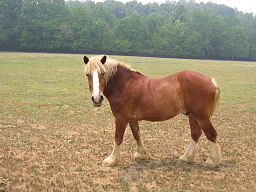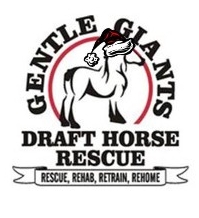Saving Horses from PMU, Slaughter and Horsemeat
~ Gentle Giants Draft Horse Rescue Challenges the "Kill Buyers" ~

Gentle Giants Draft Horse Rescue inspires me partly because of its beginnings. The founder, Christine Hajek, adopted a Belgian draft horse for herself on an impulse. Then, she met her new horse’s previous owner crying after the auction. She asked him why he was crying and he said it was because his horse was sold to the “kill buyers”. She assured him that she was not affiliated with them, but this piqued her interest.
Until the purchase of this horse, she had not been aware that the horsemeat trade was such a big business, even though she and her family had been around horses all of her life. Ms. Hajek decided to create Gentle Giants Draft Horse Rescue to help the plight of these horses. Hajek says that there are many horse rescue charities, but few that deal with the large breeds. Her mission is to save as many draft horses as she can.
Just this month, Gentle Giants Draft Horse Rescue also assisted the ASPCA in rescuing over twenty, starved Morgan horses from a situation of neglect. They have a desperate need for donations for food and medical treatment. Read about it here: Starved Morgan Horses Rescued. The situation of these horses is dire.
Gentle Giants buys horses at auctions, mostly from people who can’t take care of them anymore. Many horses at auctions end up being sold for horsemeat, or for the PMU industry. PMU stands for Pregnant Mare Urine. According to the Gentle Giants website, it is a main ingredient for the hormone replacement drug, Premarin. Premarin addresses menopausal issues such as night sweats, hot flashes and vaginal dryness.
Pfizer Corporation now owns Wyeth Corporation, which developed Premarin in 1942. To learn more about Premarin you can visit their website at premarin.com.
The Gentle Giants website says this about Premarin and the PMU Industry:
“Premarin is created by collecting the urine of pregnant mares. The mares are kept in small standing stalls in order to limit their movement, so [as] not to displace the urinary bladder bags used to collect every drop of urine. The mares are kept in this manner for a lengthy portion of their pregnancy, normally about six months. Once the mares are full term and ready to deliver, they are turned out to have their foals. The mares are able to nurse their foals until weaning age, about 4 months, at which time they are separated and the mare is bred back to repeat the whole process again. This cycle of breeding has created an overabundance of unwanted foals, most of which are sold to the slaughter industry. "PMU" farms exist all across the USA, and are also prevalent in Canada. Conditions at "PMU" farms vary, and some farms work very diligently to place their unwanted foals. Many others are not as responsible.”
Even though as many as nine million women have used Premarin, making it a two billion dollar industry, there may be health risks with its use. This industry is also referred to as HRT, which stands for Hormone Replacement Therapy.
Dateline NBC aired a story on January 18, 2004, titled “The HRT Horses, What Happens to the them when the market dries up?”, submitted by Keith Morrison. In the article, Mr. Morrison wrote:
"Then, in July 2002, a completely unexpected announcement changed everything. A portion of the women's health initiative study tested the effectiveness and safety of hormone replacement therapy. That portion of the study was halted when the women taking the Premarin-type medication were found to be suffering from higher rates of heart attack, blood clots, breast cancer and dementia."
Besides the possibility of health risks which may occur with Premarin's use, one wonders how women's health can benefit from a drug derived from the direct suffering of horses – whose suffering may be passed on energetically to its recipients?
The lifespan of a normal horse is around twenty-five years. Mares used for PMU last eight or nine years and are slaughtered for horsemeat when they have outlasted their usefulness. Besides that, many of the thousands of foals born as by-products of mares kept pregnant are not wanted, and are also sent to slaughterhouses.
In the United States, most people don’t think of horses as food. I’ve seen movies that depict starving armies that ate their horses in desperation, but in my experience, ordinary people don’t eat them. It sometimes happens by mistake, as was reported by an Examiner article, titled "Burger King admits to horse meat in burgers, Whoppers". Currently, the horsemeat industry mainly serves demand in Europe and Japan.
Gentle Giants Rescue is motivated by love to rehabilitate and find homes for many of these beautiful horses. We invite you to go to their website, gentlegiantsdrafthorserescue.com, and help support their work in whatever way you can. There are lots of ways you can help, such as adoption of a horse, volunteer programs, and of course, you can donate money. They even have an option as small as a Pay Pal donation of four dollars that buys a bag of apples. Donations help buy horses from auctions, and maintain their feed and facilities until they find new homes. The following is quoted from their Facebook Page, www.facebook.com/GentleGiantsDraftHorseRescue.
 “About: Gentle Giants Draft Horse Rescue is a 501 c3 Tax Deductible Non-Profit Rescue. We are located in Mount Airy, Maryland. We are committed to saving draft horses from slaughter, and adopting them into new homes as trail and schooling horses.
“About: Gentle Giants Draft Horse Rescue is a 501 c3 Tax Deductible Non-Profit Rescue. We are located in Mount Airy, Maryland. We are committed to saving draft horses from slaughter, and adopting them into new homes as trail and schooling horses.
Mission: All of our horses are rescued from auctions where we are their last chance before being sold to slaughter. Our horses are chosen for their temperament, soundness, and usability. Once safely home, all horses are quarantined for a minimum of 21 days, during which we ride them extensively. All of our horses are thoroughly evaluated to aid in the best possible match for horse and rider. A successful partnership creates a bond of trust and friendship for both horse and rider, and it is our goal to find that match for every horse we save.”


